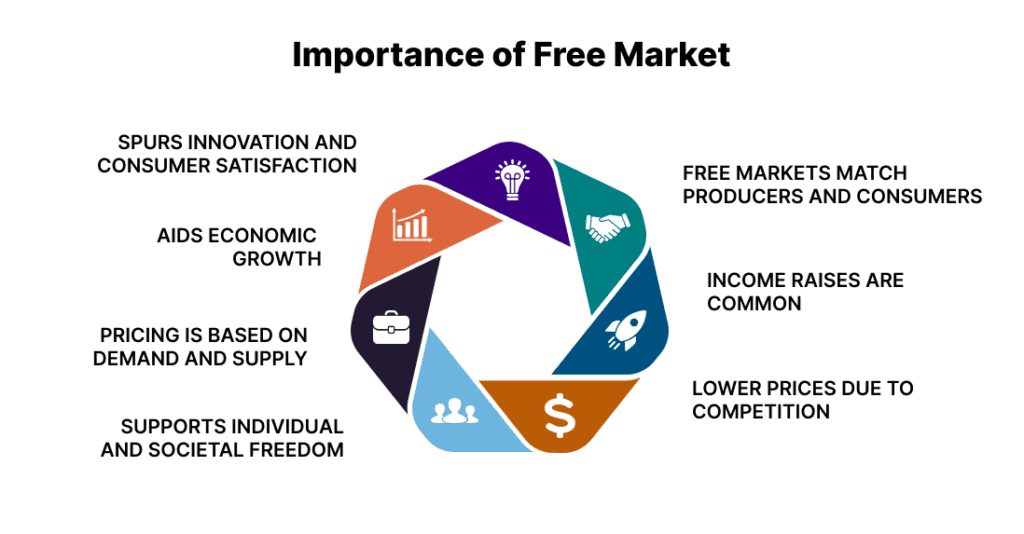Alright, let’s dive into the wild world of free markets. Ever wonder why some societies thrive while others seem stuck in the economic dark ages? Spoiler alert: it often comes down to the benefits of a free market economy. We’re talking about a place where buyers and sellers voluntarily exchange goods and services—no arm-twisting from Big Brother. It’s capitalism in its purest form, and it’s time we understand why it’s such a big deal.
In a free market, the means of production aren’t hoarded by the government. Nope, they’re in the hands of private individuals—people like you, your neighbor, or that kid from high school who started a tech company in his garage. Prices? They’re not dictated by some bureaucrat but are set by the forces of demand and supply. So, how does the free market work its magic, and why is it crucial for economic growth? Let’s break it down.
Read about: Free market vs regulated market: similarities and differences

Spurs Innovation and Consumer Satisfaction
First up, let’s talk innovation. The free market economy is like rocket fuel for new ideas. Why? Because it rewards people who can solve problems and meet needs—sometimes needs we didn’t even know we had. Think about the game-changing inventions like the light bulb, the telephone, or more recently, the smartphone. These innovations weren’t handed down by decree; they were the brainchildren of individuals who saw a gap and dared to fill it.
In a free market, if you’ve got a brilliant idea and the guts to pursue it, the sky’s the limit. Patents and copyrights act like golden tickets, giving inventors the exclusive right to profit from their creations. Remember when fitness trackers became a thing? Or when virtual assistants like Siri and Alexa started answering our weirdest questions? These products revolutionized how we live, all thanks to entrepreneurs taking a leap in a free market.
Related: First Industrial Revolution and Inventions
Sometimes, we don’t even realize we need something until it’s right in front of us. Free markets encourage this kind of forward-thinking. Products like automated home security systems or smart appliances weren’t on anyone’s wishlist—until they were. That’s the beauty of it: innovation thrives, consumers are happier, and yes, wallets might be lighter, but life gets a whole lot easier.
Free Markets Match Producers and Consumers

Ever wonder how you can order something online and have it delivered the next day, without ever meeting the seller? Thank the free market for that. It seamlessly matches producers with consumers through various intermediaries—think retailers, banks, and online platforms.
This efficient matchmaking means producers can focus on creating great products without worrying about finding buyers. Consumers, meanwhile, have access to a vast array of goods and services at their fingertips. The internet has supercharged this connection, making it easier than ever to get what you want when you want it.
It’s a self-sustaining ecosystem where supply meets demand effortlessly. And the best part? It operates without heavy-handed intervention, proving that sometimes, less is more.
Income Raises Are Common

Ever feel like getting a pay raise is like pulling teeth? In a free market economy, it’s a whole different ball game. Wages aren’t just numbers on a company spreadsheet—they’re influenced by demand and supply of labor. If there’s a shortage of workers with your skill set, companies compete to hire you, often offering higher wages and better perks. It’s simple economics, but it means you could see your income rise without jumping through bureaucratic hoops.
Take the tech industry, for example. As the world becomes more digital, skills in cybersecurity, data analysis, and programming are in high demand. Employers are willing to pay top dollar to snag the best talent. On the flip side, if an industry is shrinking, wages might stagnate or decline, signaling workers to pivot to more in-demand fields. It’s a dynamic system that rewards adaptability and skill.
In essence, the free market doesn’t just set prices for goods; it also determines the value of labor. It’s a self-regulating system where your earning potential can grow based on the market’s needs. Not too shabby, right?
Lower Prices Due to Competition
Who doesn’t love a good deal? In free markets, competition keeps prices in check. Companies are motivated to offer the best products at the lowest possible prices to attract consumers. If they don’t, a competitor will. It’s that simple.
This pressure to stay competitive leads businesses to innovate and find cost-effective methods of production. It also encourages them to improve product quality and customer service. As a result, consumers reap the benefits of high-quality goods without breaking the bank.
Read about: Laissez-faire Capitalism
The importance of free markets can’t be overstated. They promote innovation, ensure efficient resource allocation, and support individual freedoms—all while driving economic growth. While debates about their merits continue, the evidence shows that societies embracing free markets tend to prosper.
So, the next time you enjoy a product you love at a price that doesn’t make you wince, remember: the free market made it possible.
Supports Individual and Societal Freedom
Let’s not forget one of the most significant advantages: freedom. In a free market, you’re the captain of your own ship. Want to start a business? Go for it. Prefer to work for a startup rather than a conglomerate? The choice is yours. Free markets empower individuals to make decisions that align with their goals and values.
Contrast this with a controlled economy, where the government might dictate your job, your wage, and even what products are available to you. Sounds stifling, doesn’t it? Free markets, on the other hand, respect individual choice and encourage diversity in products and services.
This freedom isn’t just good for individuals; it’s beneficial for society as a whole. Societies that embrace free markets tend to enjoy more prosperity and innovation. When people are free to pursue their passions and ideas, the collective progress can be astounding.
Pricing Based on Demand and Supply
Now, let’s chat about pricing. In a free market, prices aren’t set by some distant authority. They’re determined by the good old forces of demand and supply. Imagine craving your favorite concert tickets. If they’re in short supply and everyone’s scrambling for them, prices shoot up. Conversely, if a product is gathering dust on the shelves, prices drop like a stone. It’s Economics 101, but it’s amazing how effectively it works.
This price signaling is like a neon sign for businesses, flashing “Hot Demand Here!” or “Avoid This Product!” It helps companies decide what to produce more of and what to ditch. Consumers have power here—they “vote” with their money. If they love a product, they buy it. If not, they move on. It’s survival of the fittest, and only the products that truly meet consumer needs thrive.
This natural selection isn’t just good for consumers; it’s great for the economy. Resources aren’t wasted on products nobody wants. Instead, they’re funneled into creating goods and services that genuinely improve our lives. It’s efficient, it’s effective, and it’s all thanks to the free market.
Read about: Free Enterprise vs Capitalism: Differences and Similarities
Aids Economic Growth

Here’s where things get big picture. Free markets are a powerhouse for economic growth. By allowing competition, they enable businesses to exploit their comparative advantages. That means companies focus on what they do best, leading to better products and services across the board.
Competition isn’t just about beating rivals; it’s about meeting the diverse tastes and preferences of consumers. As more businesses enter the market, they create more jobs, which puts more money into people’s pockets. Increased household income boosts spending, creating a ripple effect that fuels further economic growth.
Consumers benefit from lower prices and higher quality goods due to this competition. Companies, in turn, find cost-effective ways to produce, often collaborating with suppliers who offer the best deals. In the long run, everyone saves money, and the economy thrives. It’s a win-win situation orchestrated by the free market.
Read about: Mercantilism vs Capitalism: Differences and Similarities
